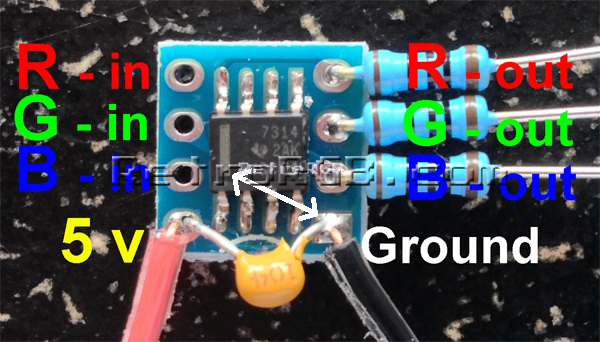The SNES Mini doesn’t output RGB (or S-Video) natively, but both can be easily added with a mod.
![]()
A quick explanation:
The SNES Mini has everything it needs to output RGB, but is missing the connections and basic circuitry. You can choose between using the Mini’s built-in RGB amp and adding the missing circuitry, or adding a newer amp and simply connecting the RGB lines.
The Best RGB Mod Methods:
Here are installation guides for the best video mods you can do on your SNES Mini / Super Famicom Jr. I’ll explain the advantages of each here, then link to the full guide:
Pre-assembled THS7374 amps:
The newer THS7374 chips provide an excellent RGB signal. You generally don’t find them in DIY projects, as they are extremely small and hard to solder! Luckily, people have created pre-made amps that include all the circuitry you’d need right on the board! This makes installation extremely simple and only requires 4 short wires to be added to the bottom of the board. I recommend beginners use this solution, for ease of use, but some experts actually prefer the look of this amp to the onboard S-RGB Encoder.
SNES Mini – S-RGB Expansion Board
This method is essentially the same as the original DIY SNES Mini mod, however all you’ll need is wire! All components are included on the board, resulting in a much cleaner look and easier installation. Plus, this includes S-Video support as well! If you’re going to use the built-in amp, THIS is the method I strongly recommend.
Older & DIY Mods:
These are guides that show you how to perform RGB and S-Video mods as DIY projects. The guides are still accurate, however I strongly recommend either of the above mods, as they’re cleaner, easier and offer more features. I’ll explain each mod below, then link to the full guide:
Use the SNES Mini’s Built-in amp:
This method is sometimes referred to as the “3-wire” mod, since you’re essentially just connecting the three RGB lines (and sync), plus a few resistors, but that’s pretty much it. The biggest disadvantage is soldering to the S-RGB can be very challenging for beginners and if you’re adding other mods, the components can get messy.

DIY THS7314 Amp:
The THS7314 amp is commonly used in many modding projects, as it’s cheap and easy to assemble. It’s a good quality amp and learning how to make your own might be fun for any DIY’ers. Here’s a guide on how to install one in a SNES Mini and for reference, here’s a page all about the amp itself: http://retrorgb.com/thsamps.html
Pre-assembled THS7314 amps:
People have integrated the THS7314 into their own pre-made board. This guide specifically shows how to install Borti’s board, however the basic instructions will be the same for pretty much anything similar (add the csync line first, tap RGB, add brightness-attenuating resistors, done):
S-Video Mod:
If you’re already doing an RGB mod on your SNES Mini, you might want to consider adding S-Video as well:
Counterfeit SNES Mini’s:
A reader emailed me to tell me there are counterfeit SNES Mini’s out there. I’ve never seen one, but if you’re worried about buying a clone, check out this page to make sure you have a real Nintendo-made system.
Feel free to go back to the main SNES page. If you’d like info on mods for other systems, head to the Getting RGB From Each System page or check out the main page for more retro-awesomeness.




